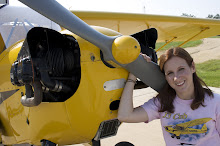One of the best things about being home is seeing my airport and EAA chapter friends. I made it out to my EAA Chapter 18 meeting for the first time since last June (yikes!). It was good to be back. Our presenter was Sean Elliot from EAA, who spoke about the history of B-17s and about EAA's B-17 Aluminum Overcast.
That night had a lot of history. From talking about grand old warplanes, we moved to a restaurant for some barbeque chicken wings and social time, in keeping with chapter tradition. As I sat there catching up with old friends, I was awed as I heard them talking about multiple airports I was unfamiliar with in the local area. It turns out they were closed, for the expansion of the city or convoluted political issues. Two were closed in my short life time.
Airports are unique. They are hugely capital-intensive, requiring massive investments with little to no payback (let alone a guaranteed one). Once an airport is closed, it is never reopened. It is redeveloped, sold off, or simply left to dry up due to incredible paperwork issues involved with reopening it.
The fact of the matter is, we are losing airports, and gaining none. The only new airport I've heard of in the past five years that I've been paying attention has been the new Branson Airport, targeted at commercial operations.
It's a frightening reality. While there is little we can do to halt urban sprawl, we are not required to sit idly by while our airports are being seized and made into shopping malls or municipal storage facilities.
Certain things catch my attention, and the dearth of airports is one. The United States is undeniably blessed with a wealth of airports, but that wealth is dwindling like an old family fortune. We have the unenviable tendency to ignore the problem until we're scraping the bottom of the barrel and coming up with nothing but slivers.
In other words: now is the time to start promoting good community-airport relationships. We must do all we can to make the airport indispensable to the community, in terms of either economic impact or intrinsic value.
Keep airports like Hales Corners, Rainbow, Aero Park, and Meigs Field in mind--that fate is not so far off for many airports we all know of. Reach out to the community through local schools and organizations--keep them involved and support their community service efforts as well.
It only takes one voice to ruin the airport's reputation, but it also only takes one positive voice to cement the airport's place in the community.
Just some things to ponder : )


Interresting thoughts
ReplyDeleteLoved reading this thankss
ReplyDelete